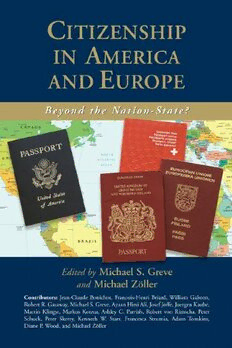
Citizenship in America and Europe: Beyond the Nation-State? PDF
276 Pages·2009·0.818 MB·English
Most books are stored in the elastic cloud where traffic is expensive. For this reason, we have a limit on daily download.
Preview Citizenship in America and Europe: Beyond the Nation-State?
Description:
Traditional notions of citizenship are linked to the idea of the democratic nation-state, a sovereign entity capable of defending itself against foreign and domestic enemies. But these notions have become increasingly problematic as the very concept of the nation-state is challenged, not only by ethnic and religious conflicts, but also by increased global mobility and the political integration of nation-states into international organizations-most prominently, the European Union. Will the concept of citizenship as we know it survive the decline of the nation-state? In this volume, scholars from both sides of the Atlantic consider how concepts of citizenship affect debates over immigration and assimilation, tolerance and minority rights, and national cohesion and civic culture. The authors explore the notion of 'constitutional patriotism,' which seeks to establish principles of citizenship in a middle ground between cosmopolitanism and nationalism; the theoretical and practical questions of citizenship, including the complexities surrounding the legal status of citizenship in the European Union and the United States; the challenges of making EU citizenship 'complementary' with national citizenship; and the issue of competing allegiances to home states and the European Union. Finally, the authors examine the centrality of rights, and the challenges of conflicting rights claims, in contemporary conceptions of citizenship. To what extent_if at all_should citizens' rights and duties change as the nation-state itself changes? In a globalizing, post-9/11 world, it is more important than ever to understand the future of citizenship and the nation-state. In essays that range from the pragmatic to the theoretical, from the historical to the personal, Citizenship in America and Europe sheds light on these crucial issues.
See more
The list of books you might like
Most books are stored in the elastic cloud where traffic is expensive. For this reason, we have a limit on daily download.
